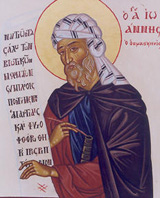| Theology of the Heart- Life of the Saints- St. Hilary of Poitiers |
 |
Doctor of the Church
310-368
 |
Feast: December 13
"God only knows how to be love, and He only knows how to be Father. And the one who loves is not envious, and one who is Father is so totally. This name does not permit compromises, as if God were only father in some aspects and not in others.”
See his writings:
May I serve you by making you known - Office of readings for his feast
The hearts and minds of all believers were one
See also:
"God only knows how to be love" - General Audience of Pope Benedict XVI
Biography
His name means "smiling". He is known as the Athanasius of the West.
He was born in Poitiers, France, at the beginning of the 4th Century. His parents were nobility. He was baptized in 345 and from that time lived a holy life. He was elected Bishop of Poitiers in 350.
He was a great defender of belief in the divinity of Christ against the Arians. In his treatise on the Trinity, “De Trinitate” he defends the doctrine of the Council of Nicea and shows that the Sacred Scriptures give clear testimony to the divinity of the Son. In other books he also interprets the events of the Old Testament as pre-figurations of the coming of Christ into the world.
The point of departure of the reflection of Hilary in faith in God the Father, Son and Holy Spirit, received in baptism. God the Father, who is love, fully communicates his divinity to the Son. He shares our human condition in such a manner that only in Christ, the Incarnate Word, does humanity find salvation. Assuming a human nature, He has thus united Himself to all man. Therefore, the path to Christ was is open to all, although on our part personal conversion is always required.
Saint Hilary combated the heresies of the Arian Auxentius of Milan. The Arians convinced the emperor Constantine, also an Arian, to exile Hilary to Phrygia, the Roman province of Asia, at the end of the year 356. His comment was, “Let us always remain in the desert with the truth being preached in this manner.” From the desert he sent his treatise on the Synods and, in 359, the twelve books of “Regarding the Trinity” to the West; the latter is considered his greatest work.
He attended the council of Seleucia of Isauria, a city of Asia Minor, in the region of Taurus. There Hilary dealt with the mysteries of the faith. After he went to Constantinople, where, in writing, he presents the emperor as an antichrist.His enemies, convinced that Hilary was a greater problem to them in the East, and they permitted him to return to Poitiers. Saint Jerome comments about the great celebration with which he was received by the Catholics there. There he did the work of exegesis, writing treatises about the great mysteries of the faith, the psalms and Saint Matthew. He also composed hymns and some attribute him the “Gloria in excelsis”.
According to Saint Isidro of Seville, Hilary was the first one to introduce the canticles to the Western Church. Years later Saint Ambrose would introduce this custom in his cathedral of Milan and the heretics would accuse him before the government, saying that because the songs were so beautiful they were taking all their followers, who were going to where the Catholics were because they sang more and better.
Saint Hilary died on January 13, 367.
His relics were in Poitier until 1652, when they were sacrilegiously burned by the Huguenots.
He has been given the title the Athanasius of the West. Among his disciples was Saint Martin of Tours. Saint Jerome and Saint Augustine called him a glorious defender of the faith.
Pope Pius IX, declared Saint Hilary a Doctor of the Church for his teachings about the divinity of Christ.
Prayer
Lord Jesus Christ, we ask that we, like your friend Saint Hilary, may also employ our life and our strength in making you known and loved more and more. Amen.
Return to main page of the Saints...
 |
Return to main page
www.piercedhearts.org
This page is the work of the Servants of the Pierced Hearts of Jesus and Mary